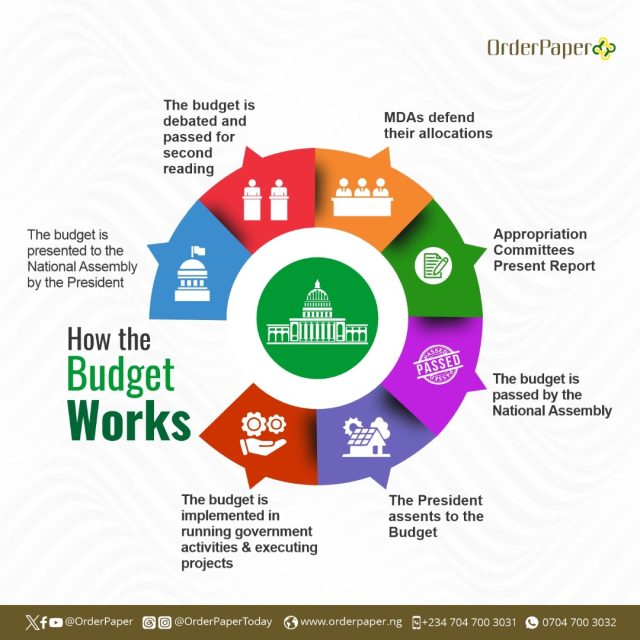
The annual budget determines how our lives as citizens are impacted by the government, which, acting on our behalf, allocates resources from our commonwealth to provide services for our benefit
Do you know that the budget is a law? And like all laws passed by the legislature, it follows the same stages that a bill travels to become law. Since it is one of the most critical laws enacted annually in the country, is it not expedient that citizens and residents of Nigeria take more than a passing interest in the budget? What’s the process of passing the budget? And where do the citizens come in?
This piece explains the budget and the budgetary process in VERY SIMPLE TERMS so as to empower everyone with information to make demands from the government, especially our lawmakers!
Before the budget gist, here’s a few things to note
President Bola Tinubu is expected to present the 2024 budget to a joint session of the National Assembly about this time today, November 29, 2023. This follows the approval of the Medium-Term Expenditure Framework (MTEF) and Fiscal Strategy Paper (FSP) by the federal legislature a few days back. As clarified in a previous piece, the MTEF isn’t just another jargon: it’s the basis for annual budget planning in Nigeria.
If the planning and implementation of the budget goes south, we’re all in trouble. None other than the Senate recently echoed what we all know – that Nigeria is in the worst economic crisis in its history. Imagine what will happen in 2024 and beyond if we don’t get back on track… So, buckle up, because understanding the budgetary process is key to navigating the road ahead.
What is the budget?
The budget is the law that outlines how public resources are allocated to ensure the welfare and wellbeing of citizens and maintain a functional society where law and order is upheld and social services are provided.
The budget, which is officially referred to as the Appropriation Bill, is introduced by the Executive, approved by the Legislature and signed into law by the President.
Guided by Sections 80–84 of the 1999 Constitution, (as amended), the Executive and the National Assembly have shared responsibilities over the national purse.
Seems simple right? Let’s break it down into the processes outlined by the law and statutes:
The budget is presented to the National Assembly by the President.
This is the first and crucial step. The President has to secure a date from the National Assembly to present the draft budget. Once the President secures a date, he lays the budget estimate with other supporting documents (as in Section 19 of the Fiscal Responsibility Act (FRA) 2007 ) to the National Assembly, usually at a joint sitting of the Senate and the House of Representatives, for careful examination and approval. The President or his representative (Minister of Finance) gives a detailed breakdown of the draft budget to the lawmakers.
The presentation of the budget by the President is considered as the first reading. At this stage of the budgetary process, there is hardly any room for public participation. Even lawmakers don’t comment at this time (except of course to the media if they so choose). Citizens are not given an opportunity to make inputs into the formulation of the budget.
The budget is debated and passed for second reading
After the first reading, lawmakers in the National Assembly look closely at the budget and debate on it to make sure it’s a good plan for the country. A date is chosen where the general principles of the budget bill are debated separately in both chambers of the legislature. After what is usually an exhaustive debate, including on the macroeconomic framework and resource allocation to sectors, the budget is referred to the Appropriation Committees of both the Senate and House of Representatives. It is deemed to have passed second reading at this stage.
The Appropriation Committee then delegates this scrutiny to the applicable standing committees of the respective chamber which serve as its subcommittees to continue legislative work on the bill.
The 1999 Constitution (as amended) empowers the National Assembly to significantly influence the budget proposal, hence, detailed examination by the Appropriations Committee is a very important part of the budget allocation and approval process.
MDAs defend their allocations
After the budget has passed second reading, it is then the responsibility of the standing committees to check all the details in the budget and ask relevant questions to ensure everything adds up. Heads of Ministries, Departments and Agencies (MDAs) are required to appear before the sub-committees to evaluate the current budget’s performance and defend their proposed budget for the following year.
At this stage, some public participation in the budgetary process is allowed so citizens can have a say in the budget during public hearings conducted by the committees. In recent years, civil society organisations and development partners have begun to hold specific budget hearings for citizens to make inputs into the process.
Collation and reporting on resource allocations
After the defence by the MDAs, the sub-committees in the Senate and House of Representatives harmonise their drafts, consider and collate recommendations.
The recommendations are then sent to the Appropriation Committee to further make recommendations on the budget. The Appropriation Committee of both chambers tend to make a joint report at this stage to make for harmony and speedy consideration. The report of the joint committee on appropriation is then presented to the plenary of the Senate and House of Representatives for consideration.
The budget is passed by the National Assembly
After harmonisation and consideration, the budget report is considered on a clause-by-clause basis before it progresses to third reading and final approval separately by the House of Representatives and the Senate.
During the consideration of the report of the joint appropriation committee, minor amendments can be made during contributions by members. After the passage of the budget, clean copies are forwarded to the President for assent.
Presidential assent
After passage by the National Assembly, the President gives a formal and overall approval to the bill. Once the President assents to the Appropriation Bill, it becomes a law ( an act of Parliament). However, if the President does not assent within thirty (30) days, the legislature possesses the authority to take decisive action. The lawmakers can, at a joint sitting, override the President’s decision, but this requires a substantial two-thirds majority vote, as provided for in the 1999 Constitution, (as amended).
The budget is implemented in running government activities & executing projects
After the passage and assent by the President, the executive swings into action by implementing the budget as provided for in the Appropriation Act.
Funds are released to the various MDAs to execute the various programmes and projects provided in the Appropriation Act. As the implementation of the budget progresses, monitoring and oversight functions are carried out by the different organs of government responsible for that. As contained in the 1999 Constitution in sections 88 and 89, and in the FRA 2007 section 30(1), the National Assembly has legislative oversight powers to monitor implementation. And this is where the power of citizens comes into play because they can exert pressure on the legislators to ensure they discharge their functions of performing oversight.
Still don’t know how this concerns you?
The budget determines where funds go: from education, to healthcare, down to the infrastructures and all the things that affect the quality of your life.
Understanding this process helps you know where you come in and with information to demand accountability. Stay tuned to thiswebsite and all our social media platforms @OrderPaper to give you all the details as the process commences.



